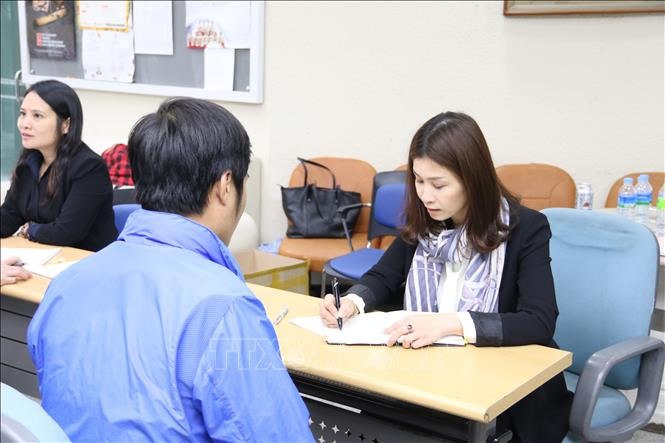 Society
Society

Labourers are asked to return to Việt Nam when their contracts end. If they do return, they will have the chance to return to South Korea to work.
 |
| A Vietnamese labourer (in blue) receives a consultation in the South Korea-based Vietnamese Labour Management Office.—VNA/VNS Photo Mạnh Hùng |
HÀ NỘI — Nguyễn Văn Sáng of Thanh Hóa Province, a Vietnamese manual labourer, has worked in South Korea’s Gyeonggi-do Province since 2015.
Sáng said he earned about KRW7,500 (VNĐ155,000) each hour. He works about eight hours per day.
“I often worked 10-12 hours per day when I first lived in South Korea,” he said.
Sáng was sent to work as a labourer in South Korea under the Employment Permit System between South Korea and Việt Nam. He was given four years and 10 months to work in the country.
He said he could have a saving of VNĐ1-1.5 billion (US$43,000-64,500) after deducting the cost of living.
With so much money available for hard workers, many people living in rural areas of Việt Nam are tempted to move to South Korea for work.
South Korea is believed to be one of the most attractive markets for Vietnamese workers because pay is higher than in Malaysia, Middle Eastern countries and even Japan.
Local residents often do not work as construction workers in South Korea because of the hard work and risks involved.
A Vietnamese manual labourers could earn KRW200,000-250,000 (US$177-220) per day if they work as a builder.
Illegal labourers
Due to the attractive salary, some Vietnamese labourers illegally stay in South Korea after their labour contracts end.
They say it was easy to get another job there because of their experience and ability to speak the local language.
Illegal workers said that several South Korean employers preferred hiring illegal workers because they did not have to pay insurances and could offer a lower salary without following the South Korean Government’s regulated rate.
However, these workers face numerous difficulties because they have no health insurance or legal documents.
If they fall ill or suffer a workplace accident, the employer usually does not pay medical fees. The cost of healthcare in South Korea is high.
Undocumented labourers often live in narrow rented rooms with poor conditions.
Despite the difficulties, the number of illegal Vietnamese workers in South Korea has remained high.
Data from South Korean and Vietnamese authorities showed that Vietnamese workers accounted for between 32 and 40 per cent of all unregistered manual workers in South Korea.
The Việt Nam Department of Overseas Labour Management also said South Korea had temporarily stopped accepting labourers from 49 districts in Việt Nam because the localities have a high rate of illegal workers who elected to stay in South Korea after their labour contracts ended.
Seeking solutions
In an attempt to solve the problem, the department and the South Korea–based Vietnamese Labour Management Office conducted consultant activities and told labourers to return Việt Nam after their contracts ended.
Đặng Sĩ Dũng, the office’s representative, said people were asked to return to Việt Nam when their contracts ended. If they did return, they would have the chance to return to South Korea to work.
For those who stay illegally, Dũng asked them to voluntarily return to Việt Nam to benefit from South Korea’s “grace period.” The period is set to finish on March 31, 2019.
Dũng said that according to the South Korean Ministry of Employment and Labour, illegal workers voluntarily returning to their countries from now until March 31, 2019 would be provided a chance to come back South Korea if they receive a new work contract.
One Vietnamese woman working illegally in South Korea said she would return to her hometown in Việt Nam if she could find a job that would pay enough to raise her children. Her children are living in Việt Nam with her parents and she sends money to them monthly.
Statistics from the department said over 100,000 Vietnamese manual labourers have been sent to work in South Korea since 2004. — VNS




